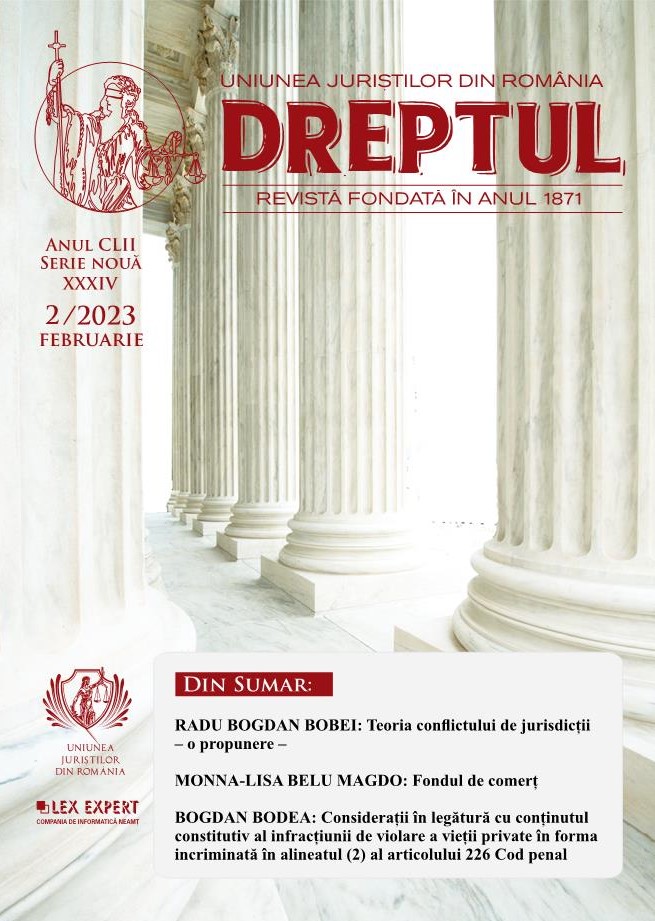Fondul de comerț
The goodwill
Author(s): Monna-Lisa Belu MagdoSubject(s): Civil Law, Commercial Law
Published by: Uniunea Juriștilor din România
Keywords: goodwill; universality in fact; commercial activity; assets of the professional; patrimony of affectation;
Summary/Abstract: In spite of the importance of the goodwill as an essential element of exercising the activity of professionals and of guaranteeing loans, its concept was not arranged in the old Civil Code and in the regulation of the Commercial Code, currently repealed, nor in the provisions of the current Civil Code. For this reason, attention was directed towards clarifying the content of the concept, which thus delimited the framework of the scientific research approach. The legal definition of the goodwill introduced by a special normative act, the Government Emergency Ordinance No 88/2017 amending and supplementing the Law No 85/2014 and then by the Law No 265/2022, qualifies it as an ensemble, a universality of movable, immovable, tangible and intangible assets, constituted by a professional, intended for the performance of his activity, in order to attract clientele and to obtain profit. The goodwill, as a universality in fact, is analyzed in the study through delimitation, but also in connection with the patrimony of affectation and the assets of the owner of the fund, both as legal universalities, with the corresponding legal consequences. The concept of enterprise, in the sense of the general regulation of Article 3 of the Civil Code, is limited to commercial enterprises, in which the systematic organization concerns not only the products and assets being part of the goodwill, but also the capital and labour, grouped and organized by the professional. The goodwill, qualified by Article 541 of the Civil Code as universality in fact, has its own identity, distinct from that of the assets of which it is formed and which are brought together within the fund, by the owner’s will, the whole being intended for a specific purpose. The intangible assets of the goodwill are analyzed with their specifics, in connection with the goodwill and its alienation, distinguishing between the sign, emblem and brand, as identification elements. Special attention is paid to the clientele and to the commercial good location. As a special application of the sale of the goodwill, it was also approached the sale of the assets of state-owned companies and of the self-managed public companies. In this context it was emphasized, in relation to the legal concept of assets, that the sale does not aim at a universality in fact, but at a legal one. The lease contract of the goodwill and the management location were examined. The limited duration of the lease contract of the goodwill and the possible refusal of the owner of the building to renew it, brought to attention the conflict between the property right enriched with the value of the commercial good location and the lessee’s privative right as regards the clientele, with the support conferred by the commercial good location. This conflict, which must be defused, was the basis for some de lege ferenda proposals starting from the regulations of the French legal system. The management location, which has as its object divisions, plants, factories and other economic subunits from the structure of self-managed public companies or of trading companies, is not a simple lease because the lessee’s obligations are more extensive, these being associated with objectives of efficiency of the activity and of the means of organization, investment and personnel policy, of rational management of resources and of increasing the quality of products and services. In approaching the rights and obligations of the contracting parties, the specificity of the contract was taken into account, distinctly according to the manner in which the lessee exploits the goodwill independently or integrates himself into the commercial activity of the lessor. In the final part, it was analyzed the real movable guarantee on the goodwill in the form of the movable mortgage, governed by the regulations concerning the movable assets, as well as the legal grounds of the exception from the indivisibility of the mortgage, in the form of real subrogation.
Journal: Revista „Dreptul”
- Issue Year: 2023
- Issue No: 02
- Page Range: 9-36
- Page Count: 28
- Language: Romanian
- Content File-PDF

